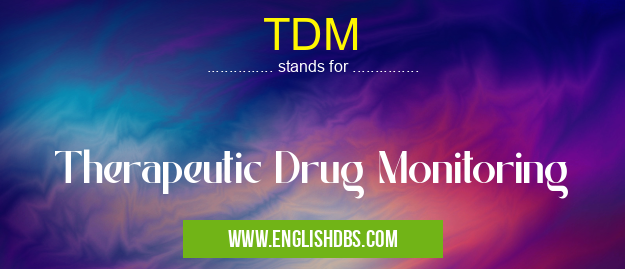What does TDM mean in CLINICAL MEDICINE
Therapeutic Drug Monitoring (TDM) is a crucial aspect of medical practice involving the measurement of drug concentrations in a patient's body to optimize their therapy. By monitoring drug levels, healthcare professionals can ensure the efficacy and safety of medications, preventing both under-dosing and over-dosing.

TDM meaning in Clinical Medicine in Medical
TDM mostly used in an acronym Clinical Medicine in Category Medical that means Therapeutic Drug Monitoring
Shorthand: TDM,
Full Form: Therapeutic Drug Monitoring
For more information of "Therapeutic Drug Monitoring", see the section below.
What does TDM Stand for?
The abbreviation TDM stands for Therapeutic Drug Monitoring. It encompasses various methods used to measure and interpret drug levels in body fluids, typically blood or urine.
Purpose and Significance
TDM plays a pivotal role in personalized medicine by allowing clinicians to:
- Optimize Drug Dosing: Adjust drug dosages to achieve the desired therapeutic effect while minimizing side effects.
- Identify Non-Adherence: Detect patients who may not be taking their medications as prescribed, leading to suboptimal outcomes.
- Manage Drug Interactions: Monitor for potential interactions between multiple medications to prevent adverse reactions.
- Prevent Toxicity: Identify patients at risk of drug toxicity due to excessive drug concentrations.
- Monitor Drug Efficacy: Evaluate the effectiveness of a drug regimen and make necessary adjustments to improve therapeutic outcomes.
Indications for TDM
TDM is commonly employed for medications with a narrow therapeutic index, meaning a small difference between the effective and toxic doses. Examples include:
- Anticonvulsants (e.g., phenytoin, carbamazepine)
- Antipsychotics (e.g., lithium, quetiapine)
- Antibiotics (e.g., vancomycin, gentamicin)
- Immunosuppressants (e.g., cyclosporine, tacrolimus)
Methods for TDM
Various techniques are used for TDM, including:
- Liquid Chromatography-Mass Spectrometry (LC-MS): A highly sensitive and specific method for detecting and quantifying drug concentrations in biological samples.
- Immunoassays: Tests that utilize antibodies to measure drug levels in fluids.
Essential Questions and Answers on Therapeutic Drug Monitoring in "MEDICAL»CLINICAL"
What is Therapeutic Drug Monitoring (TDM)?
TDM is a process of measuring the concentration of a medication in a patient's blood to ensure optimal therapeutic effects and minimize adverse reactions.
Why is TDM important?
TDM helps healthcare professionals individualize drug therapy, ensuring that patients receive the correct dose of a drug to achieve desired outcomes while avoiding toxicity.
Which medications require TDM?
TDM is typically recommended for medications with a narrow therapeutic index, such as anticonvulsants (e.g., phenytoin, carbamazepine), antibiotics (e.g., vancomycin), and immunosuppressants (e.g., tacrolimus).
How often should TDM be performed?
The frequency of TDM varies depending on the medication and individual patient factors. It may be performed at baseline, after dose adjustments, or during periods of clinical instability.
What information does TDM provide?
TDM results indicate the concentration of the drug in the patient's blood, allowing healthcare professionals to assess its effectiveness, identify potential drug interactions, and adjust the dosage accordingly.
How are TDM samples collected?
TDM samples are typically collected through a blood draw. The timing of the sample collection is crucial and should be done at a specific time relative to the last dose of the medication.
What factors can affect TDM results?
Factors such as drug absorption, metabolism, and excretion can affect TDM results. Other medications, dietary habits, and certain medical conditions may also influence drug concentrations.
How is TDM information used?
TDM results are interpreted by healthcare professionals to make informed decisions about drug dosing, monitor patient progress, and prevent adverse effects. It is an essential tool for optimizing drug therapy and improving patient safety.
Final Words: Therapeutic Drug Monitoring is a valuable tool in clinical practice, enabling healthcare professionals to individualize drug therapy, improve patient outcomes, and minimize the risk of adverse effects. By measuring and interpreting drug concentrations, TDM contributes to the safe and effective use of medications, ensuring optimal patient care.
TDM also stands for: |
|
| All stands for TDM |
